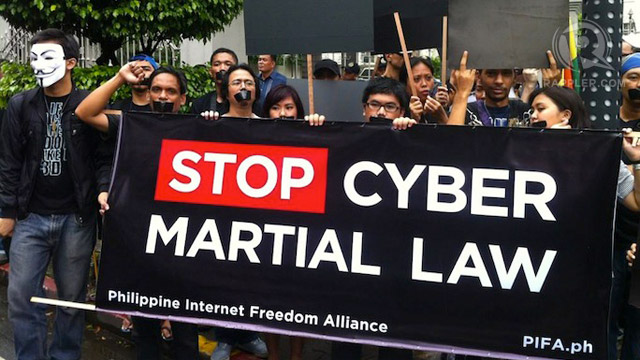SUMMARY
This is AI generated summarization, which may have errors. For context, always refer to the full article.

MANILA, Philippines – The Department of Justice will remove online libel in its proposed version of the controversial Cybercrime Act, whose constitutionality is expected to be decided on by the Supreme Court in June.
Justice Assistant Secretary Geronimo Sy said at the 3rd Regional Cybercrime Conference on Thursday, May 23 that there will be no online libel in the department’s “enhanced” version of the law, which they would endorse to the next Congress once it opens in July.
Bayan Muna Rep. Neri Colmenares, a critic of the law, explained to Rappler that a lawmaker must first file an amendatory bill in the 16th Congress before the DOJ can submit its own amendments to the law or a new version.
Aside from this, the Supreme Court can also render the law unconstitutional, which means proponents will have to craft a new measure altogether.
Criminalizing online libel is one of the most contentious provisions of Republic Act 10175 or the Cybercrime Prevention Act of 2012. The law itself sparked online debates and criticism, as well as a campaign by media organizations – including Rappler —against it.
Sec 4(c) 4 of the law defines libel as “the unlawful or prohibited acts of libel as defined in Article 355 of the Revised Penal Code, as amended, committed through a computer system or any other similar means which may be devised in the future.”
The penalty for online libel is one degree higher than ordinary libel, however.
Section 6 of the Cybercrime law states: “…The penalty to be imposed shall be one (1) degree higher than that provided for by the Revised Penal Code, as amended, and special laws, as the case may be.”
Ordinary libel is punishable with imprisonment from 6 months to 4 years; online libel gets a jail time of 6-12 years.
Online libel was not part of the original version drafted by the DOJ. It was inserted by Sen. Vicente Sotto III in 2012, however, citing the case of celebrities who were victims of cyberbullying.
In the 15th Congress, lawmakers such as Sen. Francis Escudero, Kabataan Rep. Raymond Palatino and Bayan Muna Rep. Teddy Casiño filed bills to amend the law and repeal its provisions that criminalize libel, increase penalties of crimes under the Revised Penal Code to one degree and allow authorities to collect traffic data.
A total of 15 petitions have been filed against the Cybercrime law at the SC.
In October 2012, the Supreme Court initially issued a 120-day temporary restraining order, which stopped the DOJ from implementing the law. It extended the TRO in February 2013.- Rappler.com
Add a comment
How does this make you feel?





There are no comments yet. Add your comment to start the conversation.